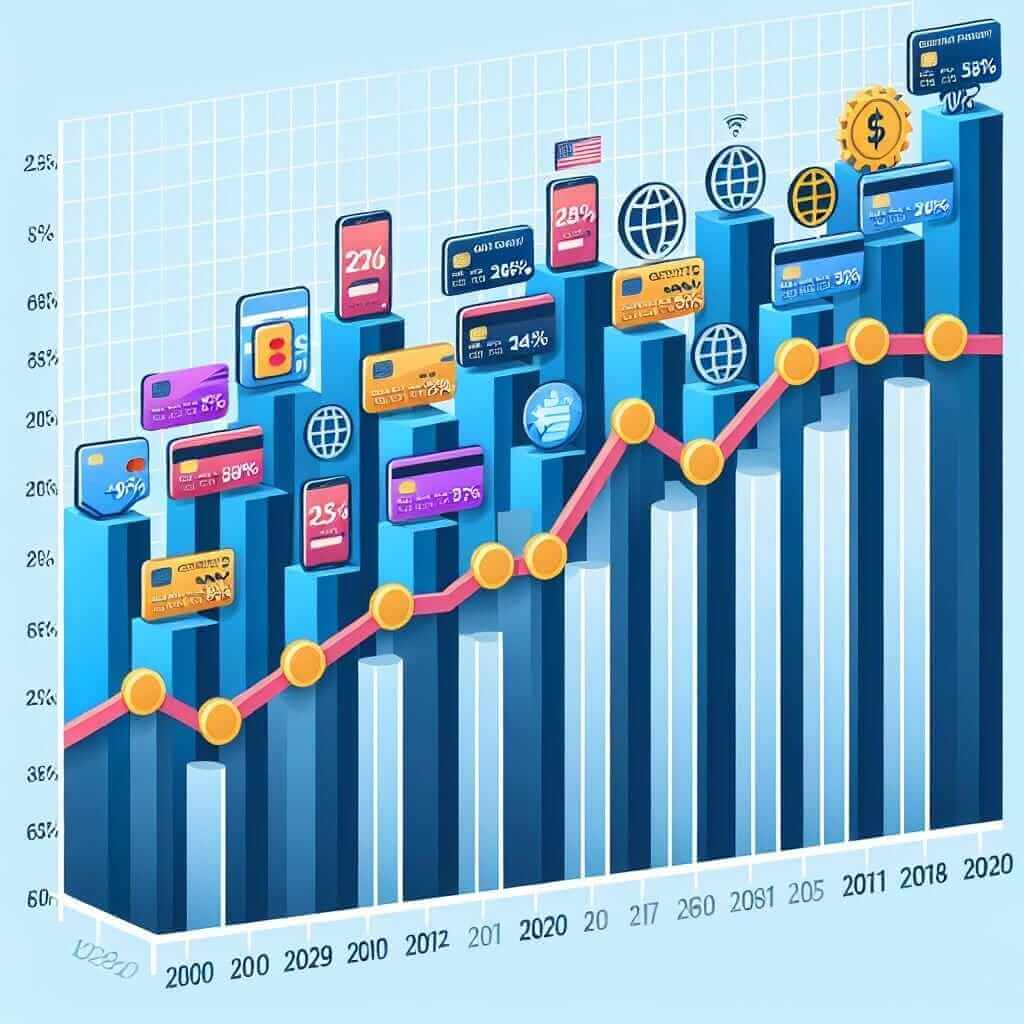The adoption of digital payment systems has witnessed a dramatic surge over the past two decades, becoming a ubiquitous aspect of modern life. This shift in consumer behavior frequently appears in IELTS Writing Task 1, requiring test-takers to analyze and describe data related to this global trend.
This article delves into the intricacies of crafting a high-scoring IELTS Writing Task 1 response focused on digital payment adoption. We’ll examine common question types, analyze real-world data, and provide a model answer with expert tips to help you achieve your desired band score.
Sample IELTS Writing Task 1 Question
You should spend about 20 minutes on this task.
The chart below shows the percentage of people using different digital payment methods in a European country between 2000 and 2020.
Summarize the information by selecting and reporting the main features, and make comparisons where relevant.
(Insert a realistic and detailed bar chart illustrating the use of digital payment methods (e.g., credit cards, debit cards, online payments, mobile payments) over the specified time period. Ensure data clearly shows trends and comparisons.)

Data Analysis and Interpretation
The provided bar chart illustrates the dramatic shift towards digital payment methods in this European nation. In 2000, traditional payment methods like cash still dominated the market. However, by 2020, the landscape had transformed:
- Credit and Debit Cards: Initially, credit and debit cards saw a steady rise in adoption, becoming the preferred method by 2010.
- Online Payments: Online payments exhibited exponential growth, overtaking cards by 2015, likely driven by the rise of e-commerce.
- Mobile Payments: Mobile payments emerged later but experienced the most rapid growth, suggesting a significant shift towards smartphone-based transactions.
Model Answer (Band 7+)
The provided bar chart depicts the changing landscape of digital payment methods in a European country between 2000 and 2020. Overall, there has been a significant shift away from traditional payment methods towards digital alternatives, with online and mobile payments experiencing the most dramatic growth.
At the turn of the millennium, credit and debit cards were used by a relatively small proportion of the population, standing at approximately 15% and 10% respectively. However, their adoption rates steadily increased over the next decade, with both methods peaking in popularity around 2010, at 45% and 35% respectively.
In contrast, online payments, while initially less prevalent than card payments, demonstrated a much steeper upward trajectory. From a modest 5% in 2000, their usage surged to surpass both credit and debit cards by 2015, reaching 55%. This growth continued, reaching an impressive 70% by 2020.
Mobile payments, absent in the early years, emerged as a significant force in the latter half of the period. Starting at a mere 2% in 2010, their adoption rate skyrocketed to 30% by 2020, indicating a growing preference for this convenient payment method.
In conclusion, the chart clearly shows a definitive shift towards digital payments in this European country over the two decades. While credit and debit cards initially led the way, online and subsequently mobile payments have become the dominant methods, reflecting broader technological advancements and changing consumer preferences. (Word Count: 200)
Key Considerations for Writing Task 1
- Paraphrasing: Avoid simply copying the question wording. Utilize synonyms and rephrasing to demonstrate your vocabulary range.
- Data Selection: Focus on the most significant trends and avoid excessive detail about every data point.
- Comparisons: Highlight key differences and similarities between different categories and time periods.
- Tenses: Use appropriate tenses to reflect the time frame of the data.
- Vocabulary: Employ a variety of vocabulary related to trends, increases, decreases, and comparisons.
Useful Vocabulary
- Surge: (n.) a sudden and great increase
- Ubiquitous: (adj.) found everywhere
- Exponential growth: (n.) extremely rapid increase
- Overtake: (v.) to become greater than something else
- Steep upward trajectory: (n.) a rapid increase
- Preference: (n.) a greater liking for one alternative over another
Conclusion: Aiming for Band 7+
To achieve a Band 7+ in IELTS Writing Task 1, focus on clear and concise language, accurate data representation, and the skillful use of vocabulary to highlight trends and make comparisons. Practice regularly, analyze model answers, and develop your ability to interpret and describe visual data effectively. By mastering these skills, you can confidently approach any data-interpretation task and achieve your IELTS goals.